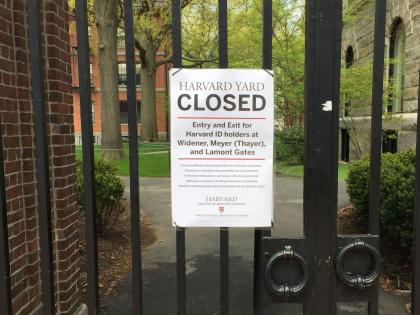The First Faculty of Arts and Sciences (FAS) meeting of the year, on October 3, heard a news-filled annual report from dean Michael D. Smith detailing an initiative on inequality in America; growth and diversification of the professorial ranks; and improvements in FAS’s finances—at least temporarily, thanks largely to a substantial restructuring of the debt it has incurred to pursue House renewal. (These topics are covered in depth at harvardmag.com/fas-octmtg-17.)
But most attendees’ attention focused on the continuation of contentious business from last year: whether the College should take action against unrecognized single-gender social organizations (USGSOs: final clubs, fraternities, and sororities), whose membership policies discriminate on the basis of gender. Anticipating wide interest, the meeting was moved from the Faculty Room at University Hall to a large Science Center auditorium, and it was nearly filled.
Professor of music Suzannah Clark, co-chair of the USGSO committee appointed by Smith, presented its final report—which, surprisingly, conveyed three possible courses of action, not one: prohibiting student membership in such organizations, effective for undergraduates enrolling next fall; retaining the May 2016 policy, in effect now, sanctioning students who join such organizations (denying them leadership positions on athletic teams or other campus groups, and withholding required recommendations for fellowships); or some mixture of enhancements in College social programs and spaces and education about inclusive community values. The regulatory approaches are meant to be an incentive to the clubs to modify their policies, and a lever to affect student choices; the third option relies on persuasion and cultural change.
Gordon McKay professor of computer science Harry Lewis, who introduced a motion last year opposing the sanctions, in the name of protecting students’ right of free association in legal organizations, produced a revised motion with the same aims. It is intended to assert faculty primacy in making policy governing student life, rather than ceding that role to administrators.
Conant University Professor Danielle Allen introduced a fresh motion, seeking to balance the right of association with the right to be free from discrimination. Invoking Massachusetts law, it would effectively extend recognition to final clubs and similar organizations; if they failed to comply with College policies on nondiscrimination and governance, students who chose to join them would then face removal from the College community—a different mix of incentives and leverage.
Further discussion and voting may take place on November 7. A complete report on the October meeting, motions, and speakers appears at harvardmag.com/usgsos-oct-17.







